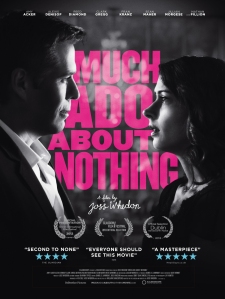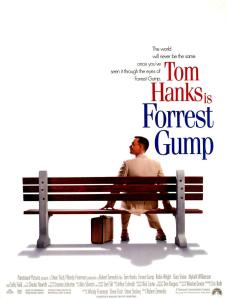Director: Woody Allen
Starring: Mia Farrow, Jeff Daniels, Danny Aiello
Movies are, for me, the greatest form of escapism that there is. No matter what’s going on with my life or with the rest of the world, I can always sit down to a good movie, immerse myself in the world presented on the screen, and be totally at peace. Once you’ve found one that you really, really love, there’s a certain amount of comfort that goes along with knowing that the events in the movie will always play out the same way. Though I’ve only seen it the one time (so far), I already know that “The Purple Rose of Cairo” is one of those beautiful films which I really, really love. Every time I see it from now on, it will always run for 82 minutes and play out as it should. But the story it presents has nothing at all to do with order or control.
Cecilia (Mia Farrow) is the world’s clumsiest waitress living in New Jersey during the Great Depression. Work sucks, sure, but life at home for Cecilia is even worse. She is married to Monk (Danny Aiello), a drunken and abusive waste of human flesh, whom she has constantly threatened with leaving but never follows through. Where else would she go? At the moment, the only place where she can relax is in the movie theater. A new release from RKO Radio Pictures has caught her attention, a romantic adventure story titled “The Purple Rose of Cairo.” In particular, Cecilia is taken with the archeologist Tom Baxter (Jeff Daniels). She enjoys the movie so much that she goes back to see it over and over again. At Cecilia’s fifth screening, something extraordinary and thoroughly impossible happens: Tom begins to talk directly to her, impressed that she really seems to like his movie, and expressing the same attraction to her that she feels for him. Suddenly, Tom walks right off the black & white screen and into Cecilia’s bright and colorful world!
The sight of a fictional character becoming self-aware and breaking the fourth wall causes some of the other people in the theater to faint. Others are frustrated, demanding their ticket money back. Hilariously, the characters on the screen are just as flummoxed as everyone else. All that they are, all that they know how to be is limited to the narrative of “The Purple Rose of Cairo.” Tom Baxter’s departure has created a level of chaos that neither the characters on the screen nor the studio executives were prepared for. After this initial setup, I wondered to myself we were going to dance around the fact that this would not have been the only copy of the movie in circulation. In fact, it turns out that other theaters have sent in reports that other characters have tried and failed to walk off the screen as Tom Baxter did in New Jersey. If somehow they eventually were to succeed, there could be dozens of Tom Baxters running around! In an attempt to return things to normal, the producer of the film brings Gil Shepherd (Jeff Daniels), the actor whose performance brings life to the character of Tom Baxter, to New Jersey to track down Tom and convince him to go back to the movie.
Tom seems incapable of being persuaded to leave our world. Although he has no real money, no idea how to start a car, and only the most basic concept of love-making, he has fallen in love with Cecilia and that’s enough for him. Things get confused when Cecilia bumps into Gil and initially mistakes him for Tom. They get to know each other and, soon, form an attraction. Cecilia has gone from no one wanting her to two men wanting her… and, as she points out, they’re both the same man. Well, only superficially. Gil is a career-minded opportunist, whereas the character he plays is a devoted and incorruptible man, one who is also pretty handy in a fight seeing as how he can’t be physically harmed. His heart however, is just as fragile as yours or mine.
Director Woody Allen was really thinking outside the box on this one. Although “Purple Rose” is by no means the only movie to have ever come up with the idea of a movie within a movie where characters literally are leaping off of the screen, it may be the one that does it best. It’s one of Allen’s best scripts, and also one of his best casts. Any lingering prejudices I had towards Mia Farrow’s career are now gone after seeing this movie. She had me that invested in Cecilia’s plight. What can you say about Jeff Daniels except that “he’s the man” (“Dumb and Dumber To” notwithstanding)? Funny thing is, the part of Tom Baxter/Gil Shepherd almost wasn’t his. Woody Allen had originally cast Michael Keaton in the part(s), and worked with him for a few days until it was realized that he wasn’t the right fit. Jeff Daniels got the sweet end of that deal, replacing Keaton and turning in a fine double performance. He’s got this look about him that not only says “leading man,” but that he can easily fit himself into a different era. Also great in supporting roles are Dianne Wiest as a hooker intrigued by Tom Baxter’s naivety, and Edward Herrmann as Henry, one of Baxter’s “Purple Rose” co-stars.
Movies have definitely become a big part of my life. There are certain characters over the years which I’ve grown quite attached to. Some include female characters whom I’ve had thoughts about which are totally NSFW. I would probably crap little blue cubes if they ever acknowledged me and stepped out into the real world. Part of the reason why I’ve only ever been to a small handful of conventions in my life is because of that barrier that stands between us and the world of fantasy. Once you’ve broken that barrier by meeting the actor or actress, it makes it real.






